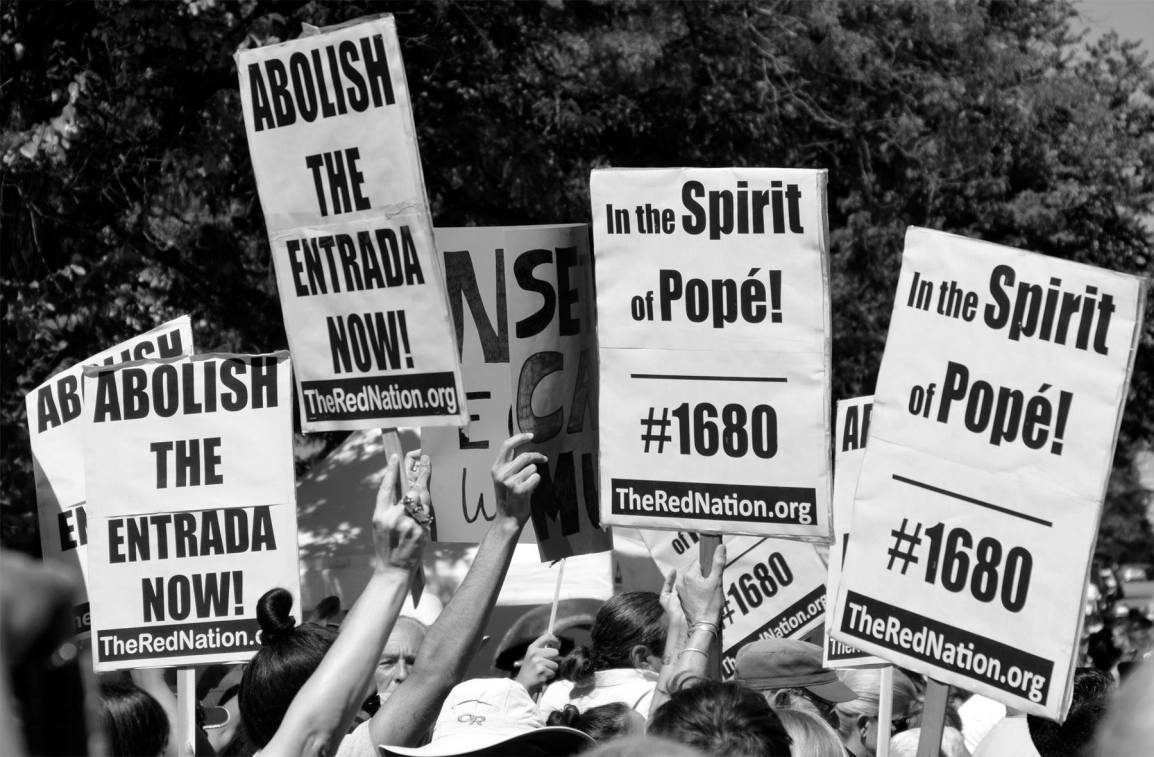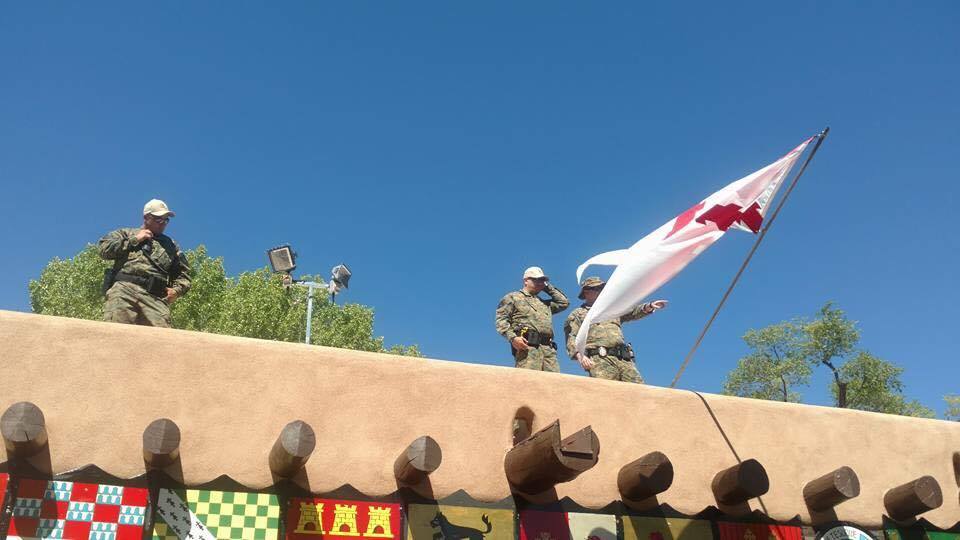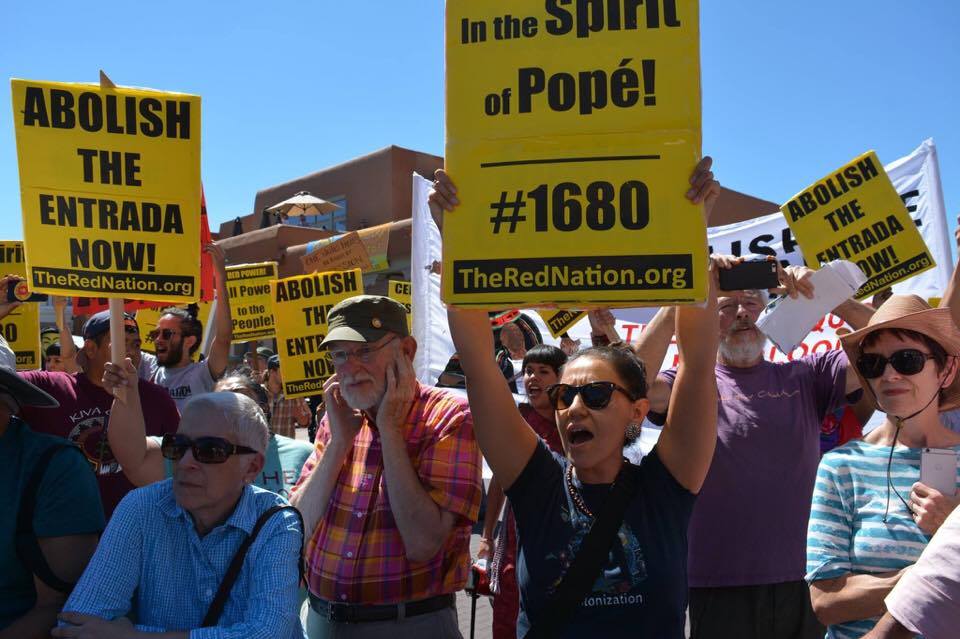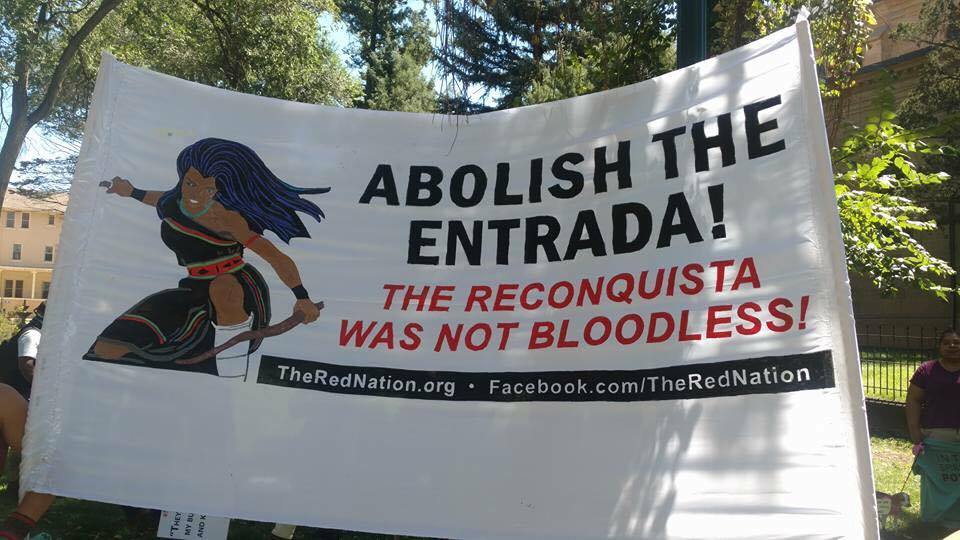Pueblo Resurgence, White Revisionism: The Bloody Truth about the Santa Fe Entrada

by Elena Ortiz and Jennifer Marley
Every fall the city of Santa Fe celebrates a revisionist historical account of the so-called “bloodless reconquest” of Santa Fe. Most New Mexicans have no idea of the origins of this celebration or its evolution. There are claims that the Entrada is the oldest community celebration in this country, but even that is historically inaccurate.
The first documented celebration of the reconquest of Santa Fe was in 1712. This celebration was primarily religious in nature with the main focus being processions featuring the Corpus Christi and La Conquistadora. This version continued through the mid-1700’s. Then, in 1883, after a lapse of more than 100 years, the Fiestas was revived. As a way of promoting Santa Fe business and tourism, the focus shifted to a more civic celebration. Ironically, it was moved to the Fourth of July to coincide with US independence.
In 1919, Fiestas was reorganized and revitalized by mostly Eastern-educated, non-Native board members of the Museum of New Mexico and School of American Research. These outsiders, led by the much-heralded grave-robber Edgar Lee Hewitt, added elements to the celebration to make it more appealing to white tourists and visitors to Santa Fe. Hewitt, a well known anthropologist was known for unlawfully excavating remains and artifacts from holy Pueblo sites, and even trespassing into Pueblo residential homes without consent. Hewitt and his ilk also romanticized the Spanish colonial era through the creation of the contemporary Entrada with images of Catholic and military glory and a bygone era.
Soon this romantic enactment of Spanish conquest made it’s way into public schools with visits by a costumed Don Diego de Vargas and his murderous merry men. Such Disneyland historical celebrations glorify the Eurocentric Spanish heritage as the dominant narrative among a population of schoolchildren more likely to have indigenous, Latinx/Chicanx heritage than Spanish, thus marginalizing the very people they seek to convert.
In 1977 The All Indian Pueblo Council and the Eight Northern Pueblos expressed their condemnation of the Entrada. Because of this the Fiesta Council sent a letter to Eight Northern asking Pueblo vendors vacate their space underneath the portal at the Palace of the Governors during Fiesta. The Fiesta Council, it seems, only wanted Pueblo people to participate in Fiestas if they were willing to play the roles prescribed by the script celebrating their subjugation and humiliation at the hands of the conquistadors.
This marginalization of Native people should be anathema for a city whose main source of revenue is tourism and when one of the main draws for primarily white tourists are the vibrant Native communities and their artistic traditions. But it is evident in the amount of money doled out by the city to promote Fiestas which, in 2015 was $50,000 compared to $31,000 for Indian Market. Both of these monies come from lodgers’ tax whose sole purpose is to promote tourism to the city. Neither total includes the additional costs, such as an increased police presence. Interestingly enough, there were no SWAT team snipers on the rooftops around the Plaza during Indian Market like there were during Fiestas. Indian Market is the largest event of its kind in the world and brings in millions of dollars to Santa Fe every year, more so than any other single event — and certainly more than Fiestas.

How does this uneven allocation continue year after year? You only have to look at the demographics on the City Council to understand why. Mayor Javier Gonzales and Councilors Carmichael Dominguez and Ron Trujillo have all played De Vargas in the Entrada.
The Entrada itself is produced by Los Caballeros de Vargas, a non-profit Catholic ministry. The President of Los Caballeros, Joe Mier, describes the Entrada as “a celebration, not that we conquered anyone. It’s a religious celebration. That should be the main focus.”
If it is a religious celebration, then the use of public funds to promote it is in clear violation of the Establishment Clause of the First Amendment which prohibits the use of religious symbols in public displays or celebrations, i.e. the “Separation of Church and State.” And it is a violation of our children’s civil rights to allow these murderous “religious figures” – Don Diego and his party — into the public schools.
The Entrada is a public commemoration of the Spanish conquest of the Southwest, supported by the Catholic Church through the Doctrine of Discovery. This legacy of settler colonialism serves only to perpetuate the myth of Euro-Spanish superiority and Indigenous, Mestizo, and Chicanx inferiority.
Santa Fe Fiesta Council president, Dean Milligan, was quoted in a recent article describing Native people on Native land as “outside agitators.” This narrative that frames Indigenous people as foreign and burdensome on their own land is not new. This is the same accusation that has been used for centuries to naturalize settlements occupying Native land. By making Native people “outsiders” or “foreigners” the settler seeks to replace the Native, naturalizing himself as the “new Native.” What this ideology allows is unrestricted access to Native land, resources, wealth, livelihood, and culture by occupying powers. We see that there is a very clear correlation to the normalization of reenactments of conquest and the normalization of resource extraction. It is with this in mind that we link our struggle to abolish revisionist history to the struggle to protect sacred sites. The growing struggle to protect Chaco Canyon a holy site Sacred to Pueblo people and Diné people concerns alike must be centered as one of the many resistance efforts that the imagery and rhetoric of the Entrada and the fabricated history perpetuates actively erases.

The challenge to Abolish the Entrada does not stand apart from the centuries old history of resistance that Pueblo people continue to uphold.
As Native people we need to remember that before Don Diego De Vargas, the Fiesta Queen and La Conquistadora became conquest theater; before the Great Lie was constructed that has perpetuated the Santa Fe Fiestas celebration of Native cultural genocide; before Anglo Euro-centric marginalization of Native heritage in Northern New Mexico — there was the Pueblo Revolt.
“The Pueblo Indian Revolution of 1680,” writes Alfonso Ortiz, a Pueblo scholar from Ohkay Owingeh, “is to be understood most profoundly as an act of restoration by the ancestors. What was restored was life, peace and the freedom of the Pueblo people whose human, political and economic rights were routinely violated by the Spaniards of the 17th century. The ancestors knew that they must fully restore the ancient teachings ‘as it has been left among us from the time of the Earth’s dawn, when all was young and green’. Thus the vision of the beginning, a fresh ever-renewable and vigorous beginning had to be fully restored and reaffirmed or the Earth would die.”

Let us remember that when DeVargas returned Pueblo People did not submit to conquest. Let us remember the continued rebellion that took place in late December of 1692, after which DeVargas proceeded to hang 70 Pueblo warriors at a gallows that stood where the Entrada takes place to this very day.
Pueblo scholars like Herman Agoyo, Joe Sando, and Alfonso Ortiz remind us that without our spirit of resistance against colonialism we would not have held onto the depth of Traditions and ceremonial life that we have today. And in order for our traditions to flourish we must make it known that celebrations that erase our history and celebrate our conquest must come to an end.
It is our mandate, drawn from the legacy of our ancestors, to enact change where change is necessary, to show courage in the face of overwhelming odds and to work to restore, respect, and preserve that which we hold sacred.
Join the Pueblo People and The Red Nation on September 8 to protest the racist Santa Fe Entrada.
In the Spirit of Po Pay!
